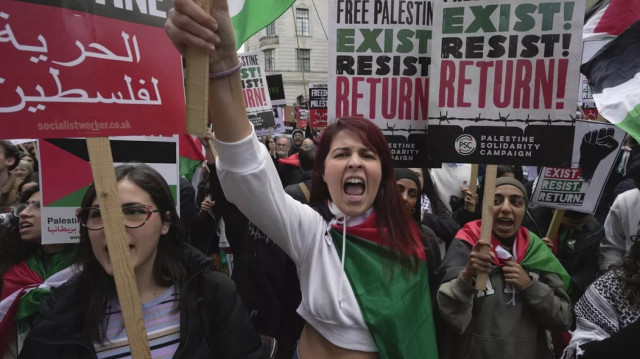
Public support for Palestine will continue but real change depends on political will, says Palestinian academic Kamel Hawwash
On Israel's ongoing genocide in Gaza, Europe was a continent divided in 2024: massive public support for Palestine on one side and staunch government backing for Israel on the other.
Hundreds of thousands took to the streets in countries across Europe throughout the year, and as Israel shows no signs of ending its assault, public pressure on European governments is expected to continue and intensify in the coming year.
However, Kamel Hawwash, a Palestinian academic and analyst, cautions that while public demonstrations are intensifying, meaningful change will depend on the political will of European governments – something he believes is influenced heavily by various factors, particularly the US and its stance.
In an interview with Anadolu, Hawwash said the public demand for justice, an immediate cease-fire, and an end to Israel's occupation has been loud and clear. Despite this, he remains skeptical that public mobilization will translate into concrete political action without significant shifts in leadership and priorities.
Hawwash argues that the political will of European leaders is tied to the approach taken by the US, especially under the leadership of President-elect Donald Trump, whose imminent return to the White House has raised concerns.
“I think quite a bit of this (political) will, unfortunately, relates to how Trump deals with this issue,” he said.
“Most of the European countries supposedly have independent foreign policies, but they will look to the US to see what it is saying.”
Trump's potential influence, according to Hawwash, stems from his ability to pressure European allies through economic measures like tariffs.
“They do not want to upset Trump,” he said, emphasizing that the incoming president's team includes individuals with “completely anti-Palestinian, racist” views who are likely to push an agenda adverse to Palestinian interests.
Hawwash also pointed to recent statements by US Republican lawmakers such as Senator Lindsey Graham, who threatened sanctions against countries that have supported the International Criminal Court (ICC) decision to issue arrest warrants for Israeli Prime Minister Benjamin Netanyahu and former Defense Minister Yoav Gallant.
“So, in terms of, do I expect to see a resolution quickly? I think the answer is no, because the international community … particularly the Americans, are allowing Netanyahu to continue to do what he wants,” he added.
- Sustaining momentum across Europe
Pro-Palestine protests, especially in the UK, have been a key feature of the ongoing push to end Israel's genocide and hold it accountable for its crimes against Palestinians, according to Hawwash.
Following the events of Oct. 7, 2023, there was an immediate outpouring of solidarity, with hundreds of thousands gathering within days to show support for Palestinians, he said.
Israel's brutality spurred further demonstrations, culminating in over 1 million people marching through London at the height of the protests, Hawwash noted.
Weekly rallies eventually transitioned to biweekly events, maintaining momentum across cities, churches, and communities.
This was unlike the Iraq war protests that happened in London, which were “almost a one-off,” he said.
“It didn't make any changes to government policy. But here, because of Israel's daily brutalities, the situation continued,” he added.
Hawwash highlighted the impact of these demonstrations on the UK's political landscape and the July elections, pointing to the resignations from the Labour Party, including his own, and the emergence of independent candidates who placed Palestine at the center of their platforms.
Among them was former Labour leader Jeremy Corbyn, who was elected to Parliament alongside four other independents.
While public pressure has led to measures such as canceling select military licenses for arms sales to Israel, Hawwash argued that these steps fall short of a comprehensive embargo.
Looking ahead, he sees sustained pressure on governments as key to ensuring that international law aligns with public sentiment.
“If elections happen in the next few months, there is no doubt that people will push their politicians to take a stand in line with international law,” he added.
- Crackdowns on pro-Palestine protesters
Hawwash criticized the UK government's response to the protests, accusing it of stifling dissent through harsh measures.
From the outset, demonstrators were labeled as “hate marchers,” he said, and the government is now “increasingly using anti-terrorism legislation to arrest people and charge them under terrorism simply for expressing solidarity with the Palestinian people.”
“To the extent that you can put out a post (on social media),” he said.
“So, the freedom of speech angle, which cuts across all issues, is being weaponized by the government to say there are limits, but only when it comes to Israel.”
Hawwash also pointed to the UK's reluctance to uphold international law in cases involving Israel. Referring to the ICC arrest warrants for Israeli leaders, he said the UK was finding excuses to avoid enforcement.
The UK was never fully committed to arresting Netanyahu if he landed in the country, “but found ways of saying we respect the court, we have our own processes,” he said.
“This is just completely obscene,” he added.
Hawwash asserted that European public support for Palestine will continue, and along with it, the increasing recognition of Israel as a “pariah, rogue terrorist state.”

